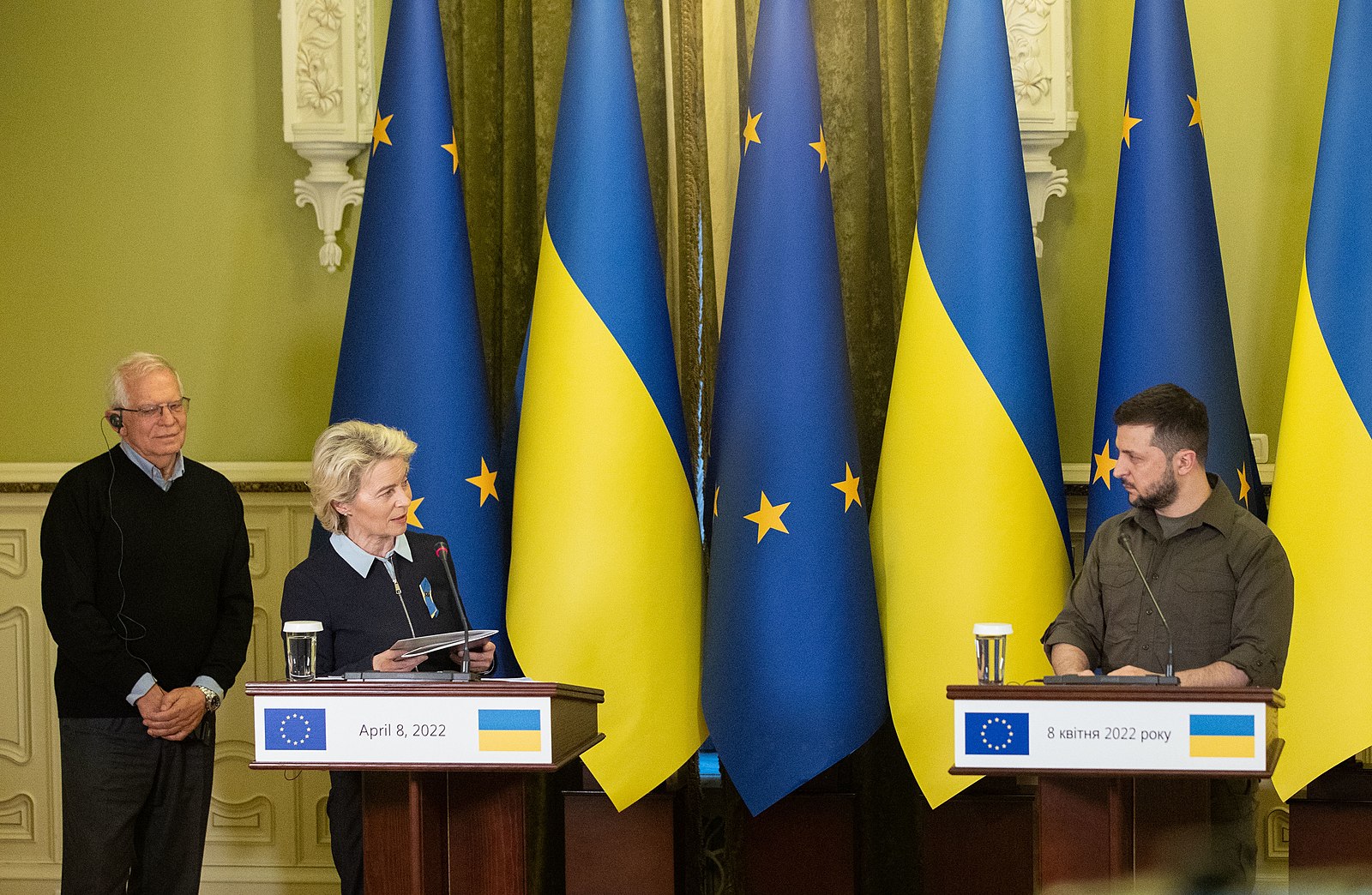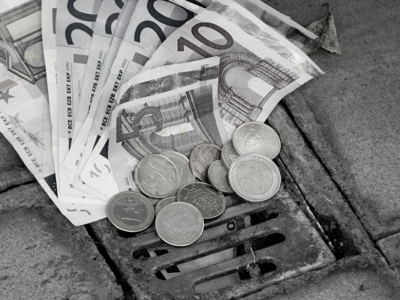The war in Ukraine and the European Union

25/05/2022
European Union (EU) observers often write that the evolution of its foreign policy is a function of how it takes advantage of crises. The immobility of the institutions during the outbreak of the war in Yugoslavia generated enough consensus to place the common foreign and security policy at a central role in the reforms of the Maastricht.
Later, the division inside the EU over Kosovo’s independence and the Iraq war showed that the interests of the states triumph over any institutional structure. The war in Ukraine is another opportunity for the Union to try vindicating itself as a geopolitical actor. However, this time no one has seriously proposed reforming the Treaties, and even the visit of European Commission President Ursula Von der Leyen to Kyiv, to symbolize Ukraine’s accession to the EU, has not made enlargement any less improbable.
In recent weeks the war has entered a phase of indefinite duration. According to military analysts, the consolidation of the eastern front predicts a gradual stagnation and freezing of the conflict, which could enter a stage similar to that experienced in 2014 in the Donbas. It is an opportune time to understand the effects of the first phase of the war on the vitality of the EU.
The mirage of EU unity in the face of the invasion
The first waves of sanctions seemed to resurrect the EU political unity. The EU’s initial reaction to the Russian invasion of Ukraine was surprising because of its apparent forcefulness and speed. It approved sanctions in just a few days that included, among other things, the freezing of all assets of the Russian central bank in the territory of Russia and the EU, or the exclusion of several Russian banks from the SWIFT payment system. In addition, the EU made use for the first time of the European Peace Facility Mechanism, in order to mobilize 500 million euros for the supply of weapons to Ukraine. The adoption of all these measures required unanimity, and it is therefore remarkable that no country opposed them- even those with fluid relations with Russia such as Hungary or Greece.
However, the most basic national interests were quick to undo the mirage. As the war progressed, the limits of the initial sanctions and some that have been adapted later became apparent. For example, the freezing of Russian central bank assets has not prevented the ruble from recovering from its initial depreciation and the exclusion of Russian banks from the SWIFT system, as it did not affect the most important ones, ended up being ineffective. Sanctions have also not prevented Russia’s current account balance from currently reaching a surplus of $ 95.8 billion, which is not only a consequence of the reduction in exports of goods to Russia but also of rising prices for fossil fuels that the EU is still consuming today.
Countries with the highest dependency on Russian gas and oil imports, notably Germany, have watered down or blocked sanctions with which the European Commission wanted to weaken Russia’s position. Merkel’s energy policy had led to an increase in the dependence on Russian gas imports into the EU to 40% in 2021. The SPD, which is now leading the federal government, has traditionally been characterized (even before Chancellor Schröder) by defending good relations with Russia.
States dependent on Russian gas imports see great difficulties in eliminating them too fast given the impact this measure would have on their industries, the price of energy, and inflation in general. This zeal has also been applied to the means of payment for these fossil fuels, which is why certain key banks – such as Gazprombank – have so far not been included in the scope of the sanctions. So, despite the unusual show of unity in the first round of sanctions, the truth is that the EU continues to have geostrategic divergences between its member states that will be very difficult to overcome.
There will be no defensive union
This crisis seemed like a good opportunity for those who argue that the EU should have defense capabilities, like Emmanuel Macron. But during an extraordinary moment of transatlantic unity, the public discussion shifted away from the Common Defense and Security Policy, and returned the centrality to NATO.
Although the strength of the initial reaction has dissipated amid disputes over sanctions, the steps the EU has taken are not negligible. Two stand out. First, the approval of the Strategic Compass document, which sets out the EU’s geostrategic objectives and what military missions it ought to undertake in order to achieve them. Secondly, the establishment of a European rapid response force has been accelerated. It can deploy a 5,000-strong brigade to any country in need of urgent assistance.
While these steps could indicate a deepening of the EU’s Common Security and Defense Policy, the truth is that the invasion of Ukraine has only strengthened the transatlantic alliance and the role of the United States in Europe’s defense. The president of the French Republic declared in 2019 that NATO was in ‘brain death’, but events have turned and the Russian invasion has invigorated the purpose of the alliance, especially for the member states of Central and Eastern Europe. Despite the announced increases in military spending by most states, including the Copernican turn of Germany, the truth is that US military spending is still much higher than in all EU countries and that NATO’s permanent security structures on European territory could never be sustained by the EU without American support. Furthermore, the economic value of the military assistance provided to Ukraine by the United States, currently upwards of 9 billion euros, is also much higher than that provided by the EU and its member states.
Likewise, the reactions of aspiring NATO members with a more complicated geopolitical position in relation to Russia – Finland and Sweden – are also illustrative of the lack of public confidence in the possibilities of the EU’s Common Security. Since the beginning of the conflict, the public opinion of these countries, far from betting on a deepening of the EU’s defensive dimension, has come to be widely in favor of joining the Atlantic Alliance as a measure to increase their deterrent capacity. Following their public opinions, the governments of Finland and Sweden have approved to apply for NATO membership and even negotiated security guarantees with NATO states for the duration of the negotiation process.
A new centrality for Poland and Hungary
The Eastern states are gaining weight, but straining the Visegrad group.
One of the initial consequences of the war was to temporarily park the tense rhetoric between the Polish and Hungarian governments on the one hand, and the European Commission on the other. In fact, Hungary’s willingness to accept sanctions against Russia was one of the highlights of the wave of European unity. This was a remarkable change because the country has maintained a multi-vector foreign policy in recent years, characterized by good relations with both China and Russia.
Given Hungary’s readiness in the first rounds of sanctions and its necessary acquisition for the adoption of more ambitious sanctions, such as those affecting oil (currently being negotiated) and gas, one could have predicted that the European Commission would have maintained a less hostile policy towards Hungary. At least as long as the armed conflict remains active. However, the Commission has not hesitated to activate the rule of law mechanism against this country, which could lead to a possible blockade of various sources of EU funding to the Hungarian government. It is not surprising, then, that Budapest is firmly blocking the adoption of a sixth package of sanctions on Russian oil imports, hinting at the need to suspend this procedure, although this is not the only factor that explains this attitude. Hungary, which is heavily dependent on Russian gas and oil, needs strong assistance from other member states in order to cope with the rapid disconnection of hydrocarbons from Russia.
Poland, on the other hand, is gaining more robust political prominence in Brussels, mainly due to its markedly hostile foreign policy toward Russia. This policy though is a point of friction with Hungary. Despite both countries sharing positions in their confrontations with the European Commission, Poland – as well as the other Visegrad Group states, the Czech Republic and Slovakia – have maintained a much tougher foreign policy with the Russian Federation. The Poles, along with the Lithuanians, are the most interested in bringing Ukraine closer to the West, given their shared history with the country.
Poland has also become the main recipient of millions of Ukrainian refugees, which has led to a great need for financial assistance to be able to cope with their reception. This wave of refugees, however, has not raised the political alarm that was experienced with the 2015 refugee crisis, and therefore has not unblocked the reform of the common asylum system that has been proposed for more than a year. The proposed changes include that countries that do not take in refugees in an emergency situation compensate financially to those who receive a disproportionate share of them.
Finally, Poland’s position has become more important partly because of the ambitious defense policy it has been implementing for years, being one of the few NATO member states to achieve the military spending target of 2% of its GDP. On paper, this places it in a leading position towards the achievement of the Common Defense and Security Policy. However, Warsaw has always prioritized channeling its defense policy through NATO. Its conception of EU defense policy is that of a complementary tool, subordinate to the structures of the Alliance.
Beyond Poland and Hungary, all the EU’s eastern states have managed to increase their influence. Many had warned in recent years about the goals of Russian foreign policy. In the last years there have been decisions that have blatantly ignored their interests – such as the construction of the North Stream 2 pipeline by Germany. This and the growing geopolitical relevance of the eastern border have led to the priorities of the eastern states gaining relevance in Brussels, Paris, and Berlin. It was probably this pressure and the need to show itself to be an influential actor that pushed the Commission to declare that Ukraine will have a quick access track to the EU. This is a move that could put the EU in a difficult position in the future because accepting Ukraine is ruled out in the medium term by the vast majority of members. It does not meet the legal requirements, nor is it in the interest of the majority to take a step that Russia would perceive as aggression.
Conclusion
That the EU has not become a new defensive alliance in the context of this war does not mean that it has not taken significant steps. The measures we have explained in this article would have been difficult to materialize without a context of crisis. But neither will Ukraine become a member state in the medium term, nor will the EU institutions change profoundly. The Union is only an international organization, albeit with a powerful executive arm and a ruling class with autonomy from its own members. The expectations that this generates are, however, systematically disappointed. When during a crisis the actors with geopolitical weight take positions, the reaction of the EU is always less than that which would correspond to a State with its resources. The problem is that this comparison is spurious. When we put the Union in its appropriate category, that of international organizations – although it has some unique characteristics compared to other international organizations – we can better understand its reactions. Making this false comparison is not the sole fault of commentators and pundits. The Commission itself also uses state rhetoric and symbolism when it suits its own interests.
Daniel Roldán is the Editor in Chief of the CGI. He is interested in matters related to the EU, the MENA region, and International Law.
Jofre Rocabert is an analyst and Director of Research of the CGI. He is interested in international organizations and regionalism.


